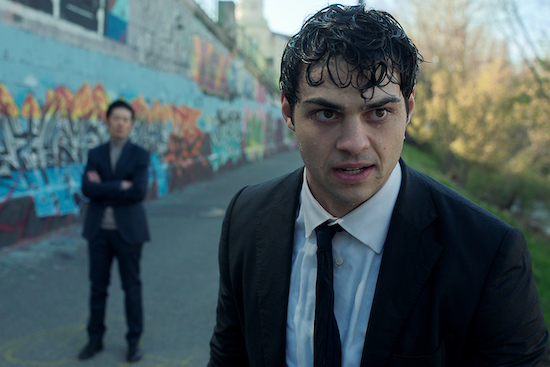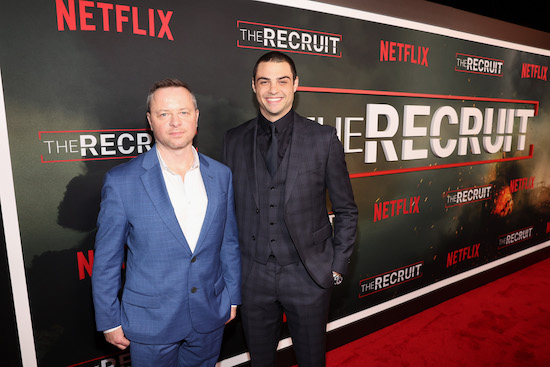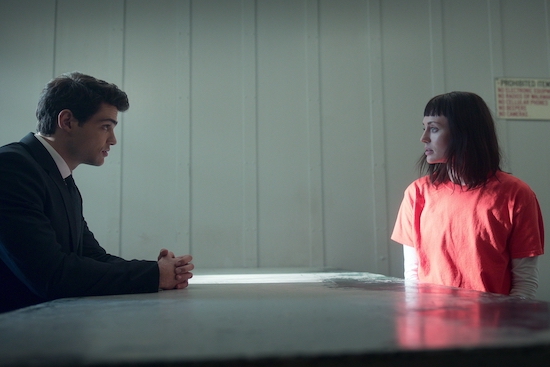THE RECRUIT Boss Alexi Hawley on the Unconventional New Netflix Espionage Drama
December 16, 2022 by Marisa Roffman

The Recruit. Noah Centineo as Owen Hendricks in episode 103 of The Recruit. Cr. Courtesy of Netflix © 2022
In the new Netflix drama THE RECRUIT, Owen (Noah Centineo), a young lawyer, joins the CIA. While he joins the agency looking for adventure, it becomes clear, quickly, he’s in over his head: Colleagues who are looking to sabotage him, a messy personal life that he can’t always keep separate from work, and potentially life-changing information that falls into his lap during the first days of his job.
And while there’s plenty of action, the show also blends humor (evident from the series-opening moments when Owen is singing at a very unexpected time) as well as the reality that Owen really is in over his head and won’t make all the right decisions when his back is up against the wall.
But for showrunner Alexi Hawley—who is also behind THE ROOKIE franchise on ABC—blending the show’s genres is part of what makes THE RECRUIT fun to explore.
“Even when you’re trying to turn a genre, or genres on their head, you have to understand the genre and you have to give the audience what they expect from the genre—you just have to do it a different way,” he tells Give Me My Remote. “For me, the show is actually a hybrid. It is an espionage drama, but it also is YA.”
Here, Hawley talks about the new series, crafting a show for streaming, making sure the stakes of the show were clear, and more…
How did THE RECRUIT come to be?
This started out as a pilot somewhere else and then didn’t go. Most of the time with development, there is no resurrection for pilots; it’s not like the movie business, where a great script can always find a place. I ended up at [production company] eOne, [director] Doug Liman and his company ended up at eOne—and I had done it with them. Ultimately, we were like, how do we get this thing set up? We needed to attach a star—that’s the way these days. But the question is, the lead of the show is a 24-year-old guy. How many 24-year-olds [are established enough to qualify], and it’s a very short list; Noah Centineo is at the top of it.
But most of the time in the world, you get those fantasy lists, and it never happens. Rewardingly, his team first loved the script for him, and then he loved the script. He joked that when he read it, he was like, “Who gave this guy permission to get in my head?” He just really saw himself in this role, which was great. And so he came on board, and then we took it out, and Netflix jumped at it; they bought it basically off of the first script and the pitch.
When you were originally developing the series, was it intended for a network, where the formatting/content might have been a bit different?
No, it was basically this. It wasn’t network…there were some adjustments that were made, but not honestly a ton. The voice and the point of view on the show has always been the same. It’s a bit of an absurdist world, but it’s more real—that’s always the funny thing, that truth is stranger than fiction.
The original idea is based on the idea of graymail, which is blackmail with national security. It was sort of loosely inspired by this guy, Adam Ciralsky who is an executive producer on the show, but also was a lawyer at the CIA right out of law school and had come across graymail—all that’s real. And that just seemed like a fascinating way in. One of the first things that Adam said to me when we were talking about his experience at the CIA was, “The CIA is not sexy; it’s the post office with secrets.” I love that. I’ve never heard that.
What got exciting to me about it was twofold. One was doing that world, a world in which…the CIA is full of soccer moms and dads, and people who [are not always] these high powered, high tech [agents]. There are elements of that within the CIA that exist, but a lot of it is a bureaucracy the way that any government institution is a bureaucracy. So to put that world on the screen was super fun.
And then to come at it through the point of view of this 24-year-old kid, fresh out of law school, who joined the CIA because, honestly, his whole life he’s been jumping in the deep end just to see if he can get back out. [He] didn’t want to do the boring work of a first-year associate, but was wanting to get his hands dirty on day one, whatever that meant. This guy, as he says in the show, who faked it till he made it. It’s a really bad approach when he joined the CIA.
My whole pitch on it was nobody can be James Bond. Nobody can be Jason Bourne. But everybody’s had a first job. Everybody’s worked at a place where their coworkers were out to get them. Everybody has had that experience where they felt in over their head in their 20s. And so he’s got roommates, which you’ve never seen any spy thing ever do. All of that, to me, was a fresh way [to approach this story], and I think that’s why Netflix got so excited about it.

LOS ANGELES, CALIFORNIA – DECEMBER 08: (L-R) Alexi Hawley and Noah Centineo attend Netflix’s The Recruit Los Angeles Premiere at The Grove AMC on December 08, 2022 in Los Angeles, California. (Photo by Jesse Grant/Getty Images for Netflix)
With THE ROOKIE and THE ROOKIE: FEDS, you’ve been writing stories about people new to their field at a more mature age. Outside of the roommates, what are elements of the “new to this job/field” story that you can tell exclusively for someone in their 20s?
That was really one of the things that I, and then the writers’ room, was trying to keep in the front of our head at all times. Even when you’re trying to turn a genre, or genres on their head, you have to understand the genre and you have to give the audience what they expect from the genre—you just have to do it a different way.
For me, the show is actually a hybrid. It is an espionage drama, but it also is YA. It is him and his roommates. He and Hannah used to date, but they’re probably secretly in love with each other still—all that stuff. There’s a moment [later in the season] when Hannah calls her mom and her mom’s like, “I’ll help you, but you have to [do this for me],” to me, was such a YA moment, which is great. You’ve never seen that before—nobody’s calling their mom in Jason Bourne. So that was the fun of it: how can we keep these two genres in our head, and give the audience what they want for them.
But, he’s a lawyer, not a spy. And I’ve said from the very beginning, the second he gets good at his job, so to speak, I’m not interested. I love this kid who just always goes the wrong way down a hallway, jumps in a car to drive away from getting shot at—and goes eight feet and hits a wall. That to me is so much fun…Doug and I got excited about this idea of, okay, he steals his car and he’s driving the wrong way through traffic. Every time you’ve ever seen that [on TV and in movies], it worked out totally fine. Well, he heads into another car and has to be like, “Sorry!” All that stuff was just really fun to play with.
This marks your first show on a streaming platform. How did the flexibility in format—run time, episode count, etc.—impact how you were able to craft this season?
To be completely honest, it didn’t really. We broke every episode with a five-act structure. Network is six, which is too many. I’ve been frustrated over the last five to ten years with a lot of streaming shows that think of themselves as an eight-hour movie, that episodically don’t have a beginning, middle and end, because they feel like you’re gonna watch so many. That drives me crazy. And I’m like, we’re going to write this with act breaks, because that forces you to turn the story. What’s happening right at this moment that’s exciting enough that I’ll come back? Which I thought was super valuable. We also broke it into two-episode arcs, so every two episodes [they’re facing] something different, and I think you feel that in the show. It never stays still.
I think audiences, if you’re gonna binge, want to be propelled through rather than, “Oh, I guess I’ll watch another one. I was on the fence about it, but then something happened at the end, so I’ll watch the next one.” So, I definitely had that in mind.
In terms of running time, these days Netflix is very sensitive about episodes being a certain length. Nobody has better algorithmic numbers and metrics than they do, and they have found that episodes between 45 and 50-ish minutes are the ones that get the most binge. When we were trying to lock the cuts and [were] editing them, there were definitely some calls going, “Can you tighten it up a little more, because right now it’s 54 minutes and we’d like it to be 52 or 50?” And sometimes you did, and sometimes you got to a place where you’re like, “I’m actually going to hurt it if I make it shorter.”
You mentioned you were partially courting a YA audience. What conversations were there about the language that could be used and violence that could be shown?
We honestly didn’t have much of a conversation about that. In 2022/2023, I think audiences, even younger audiences, realize it’s just language.
The thing that actually was the biggest conversation at the outset was about pulling Owen’s fingernail out in the first episode. Originally, it was two. [Netflix] saw this as a super broad audience, which I do, too—this does appeal to everybody. If you love spy, if you love Noah Centineo, it will go from 12 to 90-year-old [viewer who] can watch it. So, they were a little concerned that they would turn people off with it.
And my point of view was like, I don’t have to pull off two fingernails, but I have to pull out one because…that’s the stakes, right? And it’s the same thing we do on THE ROOKIE—because series regulars have died, the audience, unless it’s Nathan [Fillion’s Nolan], the audience is always a little bit like, “Oh, shit, they’re not gonna kill them, are they?” Which matters. [On] so many shows, everybody knows people are untouchable and [death] never happens, except for maybe once in a blue. And we’ve done a bunch of it over the years.
Also, you’re going along with this guy. For the first 20 minutes of this first episode, you’re having a great time and you love him because he’s just so captivating. And there’s stakes, but it’s more backstabby stuff. And then you need that moment. You need the audience to be with him when he goes in there, trying to be this guy, and then gets his fingernail pulled out. Because that turns everything. So that was one of the moments that…I mean, I didn’t have to fight for it, they definitely heard me. But [it was] more [of a conversation] than a “f—” or a “s—” here or there.

The Recruit. (L to R) Noah Centineo as Owen Hendricks, Laura Haddock as Max Meladze in episode 101 of The Recruit. Cr. Courtesy Of Netflix © 2022
Owen quickly becomes entangled with a former asset, Max (Laura Haddock), who threatens the agency. What intrigued you about their dynamic?
It’s a story about two people who need each other, but who can’t trust each other, really. I thought it was really fascinating.
I never wanted to fall into the place where it became easy—this is not a buddy-cop kind of thing. Most of those two-hander ideas, they’re butting heads in the first act, then they ultimately come together in the second act, and then they are buddies in the third. That fundamentally is not this story.
This is a story where she took one look at him, as he says in the pilot, and it was like Christmas came early. Like, “Here’s this kid who doesn’t know how to work the copier. I will be able to manipulate him to do what I want.” And, honestly, he kept surprising her. He likes to run downhill as fast as he can to see if he falls down. That’s not normal, but that makes him really interesting to her.
Even outside of Max, Owen really doesn’t know who he can trust within his own team. What fun did that tension bring to the dynamics you and the other writers were able to play with?
That was the template of the show…it’s why there weren’t these weren’t two separate stories [of his personal life and his work life], and ultimately they were all one story. I live for the unexpected; I think it’s so hard to do that in this day and age. But I think creating a universe in which that can happen, in which you never know what’s going to happen, it all was great. You’re going in [to it] thinking this show is going to be about [the dynamic with] Max, and it’s not just about Max. It’s everything in Owen’s world. Max is obviously a huge part of it, but teaching the audience, oh no, things are gonna come up that you don’t expect and things are gonna turn is just sort of in the DNA of it. And I think it makes it very fun to write. It also makes it a little bit more challenging, because you challenge the writers’ room to come in with [the mindset of] if we think it’s gonna go right [for Owen], we cannot let it go right.
THE RECRUIT, Now Streaming, Netflix
Follow @GiveMeMyRemote and @marisaroffman on Twitter for the latest TV news. Connect with other TV fans on GIVE ME MY REMOTE’s official Facebook page.
And be the first to see our exclusive videos by subscribing to our YouTube channel.
As an Amazon Associate we earn from qualifying purchases made through links/ads placed on the site.
Related Posts
Filed under The Recruit
Comments Off on THE RECRUIT Boss Alexi Hawley on the Unconventional New Netflix Espionage Drama



Comments